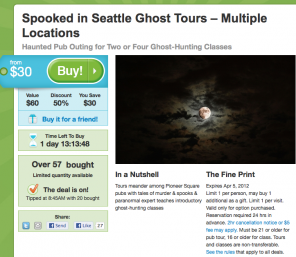Remember When Groupon Was the Hot New Thing?
The deal site backlash has lashed back: the New York Times went to press with a story on deal sites over the weekend that included everything but a hand-drawn tombstone and the words RIP.
Just a few months ago, daily deal coupons were the new big thing. The biggest deal maker, Groupon, was preparing to go public at a valuation as high as $30 billion, which would have been a record amount for a start-up less than three years old. Hundreds of copycat coupon sites sprung up in Groupon’s wake, including DoubleTakeDeals, YourBestDeals, DealFind, DoodleDeals, DealOn, DealSwarm and GoDailyDeals. Deal sites were widely praised as a replacement for local advertising.
Now coupon fatigue is setting in.
The upshot, as summarized in another context? “Groupon is just payday loans for businesses,” wrote @vouchey (aka Mike Fourcher) on Twitter. And businesses are wising up to the promise that an initial great deal always brings hordes, let alone instils loyalty. “Even the biggest Web retailer, Amazon.com, has had trouble gaining traction in oversaturated New York, where it started offering deals with great fanfare a month ago,” notes the Times.
Their unscientific survey of responses to Amazon’s Big Apple-centric deals found only one that reached triple digits, an “Asian bistro” that netted 109 buyers. In Seattle, today’s AmazonLocal deal for a month-long exercise boot camp ($200 value! going for $30!) has so far drawn 110 buyers. Meanwhile Tippr, home of the “hottest daily deals in our city,” is offering not one but two trips to a resort in Belize, stretching the meaning of “in our city” substantially.
This doesn’t mean deal sites are always and everywhere a marketing gimmick. But it does tend to underscore the contrarian view to the hype around deal sites: that, employed judiciously, they may work well for select kinds of businesses, but employed indiscriminately, they can do a great deal of harm to businesses without cushy profit margins, or in comfortable cash flow situations. That is, precisely the kinds of businesses who may clutch at Groupon as at a lifesaver.
The “Live Off Groupon” experiment concludes with two briefly noted RIPs of its own:
This post recognizes my favorite overall Groupon restaurants as opposed to individual items featured in my last post. A small distinction maybe, but there were just too many incredible restaurants to fit them all in one post. Unfortunately two of them closed this year, leaving my top 5, of which three are from my home town of Chicago!
That is where Mike Fourcher’s payday loan analogy comes into play. Back in June, when Groupon had just turned down a $6-billion buyout offer from Google (you can’t say Groupon wasn’t drinking its own Kool-Aid), I wrote down an analysis of that easy-money dynamic:
What is the most salient feature of the social coupon, after all? It’s not the coupon idea. It’s not online delivery. It’s not steep discounts. All of these were available before. (Even the massive audience Groupon provides was around in one form or another.) It’s the transposition of the sequence of events (the small business owner and Groupon make a sale…and then Groupon takes the lion’s share). You could call it misdirection: Watch this sale! says Groupon, and the smiling business owner fails to feel the difference, that it’s not really their sale anymore.
Notice that the small business owner still has to take the marketing theory on faith: These customers will return, spending like sailors! (Not that this doesn’t happen–but Groupon’s ability to guarantee conversion rates is not, I suspect, much better than anyone else’s.) So the main thing that has changed, really, is simply that Groupon has deferred charging for this trial-offer form of advertising until that first sale is made. It’s still the small business owner’s money, but it’s associated in time with the benefit of making a sale.
The New York Times quotes Kevin Walters, a restaurant owner who was ruminating over trying another daily deal, after a disappointing start: “I’m in East Harlem. If the rest of the economy is shaky, then East Harlem is depressed. One way or another, I need to get people here.” That “one way or another” reasoning is how people talk themselves into paying rent with a payday loan, but of course, the tricky part is that soon there isn’t another way.
- Share this:
-
- Share
- Digg
- StumbleUpon
![]() is an online magazine of news & culture. It's a conversation about all the things on Seattle's mind.
is an online magazine of news & culture. It's a conversation about all the things on Seattle's mind.
- More about us.
- Got a tip for us? We'd like to see it. Just send an email to .
- If you'd like to contribute regularly, .
- Twitter: @thesunbreak | Facebook
- iPhone app download
(Free!)
Regular reader?
Subscribe to The SunBreak for just $1 per month, and help keep the news & culture coming.
Delivery Options
-
 Subscribe to all SunBreak Stories
Subscribe to all SunBreak Stories -
 Daily Email Digest of The SunBreak
Daily Email Digest of The SunBreak


